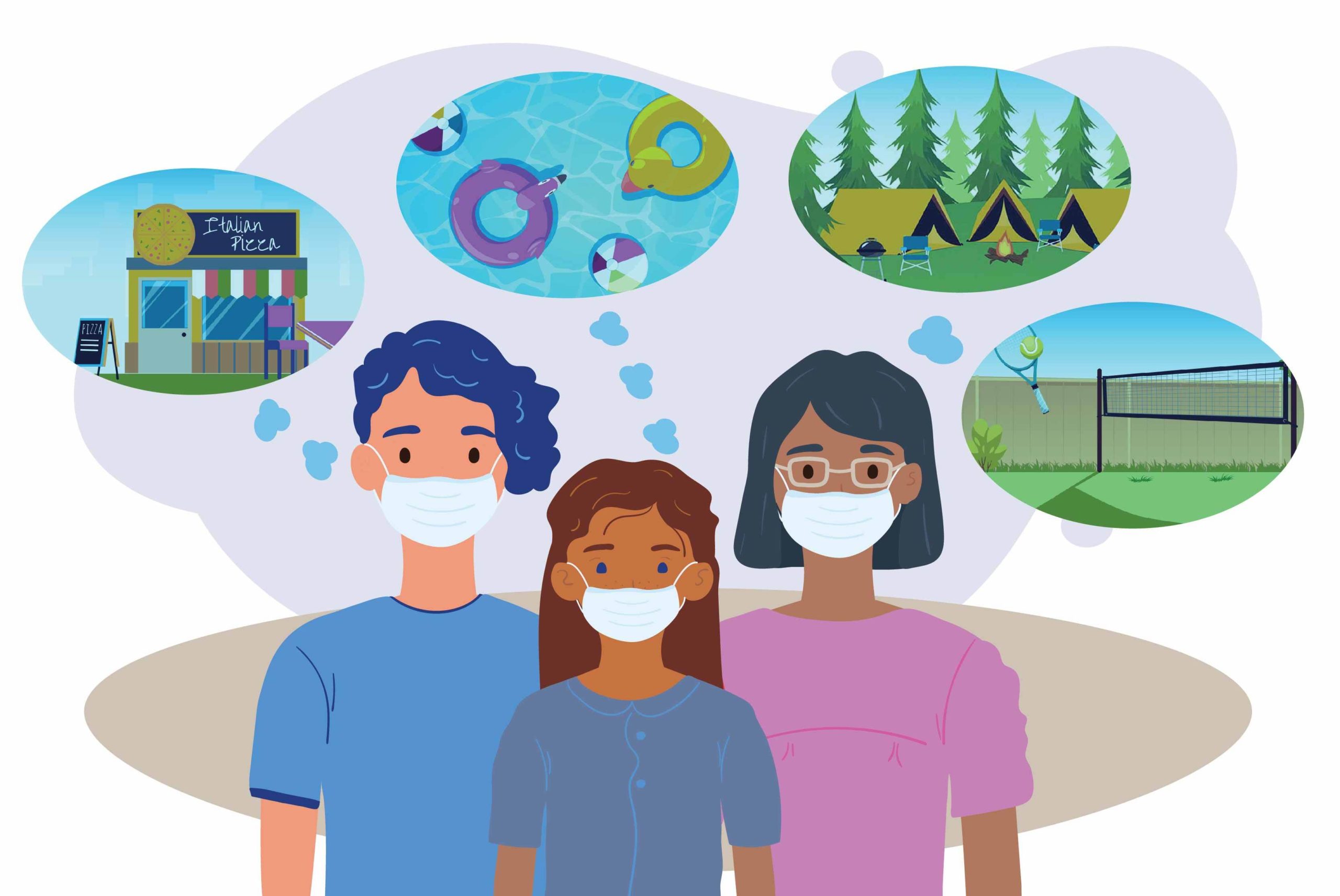COVID-19: What we know and how to cope with an uncertain future

Last March, when the world as we knew it shut down because of the coronavirus, we imagined we’d be home for a few weeks at most. But here we are, a year later, still unsure when our lives might get back to “normal.” And it’s still unclear what a new normal might even look like.
So, how do you plan your life when there are still so many unknowns? Will we be able to send our children to camp or plan a family vacation? And how do we cope with not knowing all the answers right now?
To offer some advice on how to navigate this uncertain time, we reached out to Dr. Melanie Dubois, an infectious disease specialist, and Erica Lee, a psychologist in the Department of Psychiatry at Boston Children’s Hospital. Together, they offer some perspective on what we can expect the next few months to look like — and how to get through them.
Understanding our current reality
According to Dr. Dubois, we have come a long way since March 11, 2020, when the World Health Organization declared the COVID-19 outbreak a global pandemic. “We have a better understanding of the virus, its transmission, and have several COVID-19 vaccines that are approved for adults,” says Dr. Dubois. “At this time, we need to remain vigilant as we continue with the vaccine rollout and await further data from vaccine trials in children.”
“While we are starting to get people vaccinated and the numbers of COVID-19 cases are going down, we’re not over this pandemic yet,” she says. “We will still need to wear masks in public, encourage outdoor activities with friends and extended family, and follow social-distancing precautions.”
She says until we have a vaccine that can safely be given to children under age 16, there is still a risk the virus can spread among this age group, as well as in those who are not vaccinated. There’s also still a big question about new variants of the virus and if the vaccines will be as effective against them. Then there’s the question of how long immunity might last.
“We are starting to see updates to CDC guidelines for those who are fully vaccinated, but it will be some time until we are able to get back to a normal routine,” says Dr. Dubois. “It remains important to continue to follow public health guidance to prevent spread of COVID-19 and protect those who are not vaccinated.”
How to cope with this uncertainty
So, knowing that our lives may hold much uncertainty for the near future, how do we cope with that? We turned to Erica Lee for these tips:
- Try to accept uncertainty. “Remember that uncertainty is a natural part of life, and even when we’re not in a pandemic there are always things we can’t control,” says Lee. She says since we can’t eliminate uncertainty, the best strategy to cope with uncertainly is to accept it. “Focusing on the uncertainty can worsen your anxiety or lead to hopelessness or avoidance behavior,” says Lee. “This just makes things feel harder. Instead of fighting the uncertainty, learning to accept and cope with it feels much better.”
- Focus on what you can control. With so many things out of our control, it can help to focus on those we can. “For example, although you may not be able to see your friends or family as much as you’d like, you can still find ways to meaningfully connect,” says Lee. “And while we can’t control the overall spread of COVID-19, we can take important steps to keep ourselves safe.”
- Practice mindfulness. Focusing on the future is often very anxiety-provoking, especially right now, when so many things are uncertain. “When we focus almost exclusively on future, we can miss out on the opportunities we have right now to experience joy or contentment,” says Lee. “Mindfulness is the practice of living in the present moment, without judgment, which has benefits for both physical and mental health.” She suggests practicing mindfulness in short bursts. For example, when you’re outside taking a walk, try to pay attention to what you’re seeing, hearing, smelling, tasting, and touching along the way. “When you’re feeling anxious or your mind is spinning, try to concentrate on your in-the-moment experience rather than what may or may not happen in the future.”
- Use “and” statements. This is the idea that two things that might seem contradictory can be true at the same time. “For example, you could remind yourself, ‘We don’t know if we can go on a vacation this summer like we normally do, and we can schedule some fun mini-vacations,’” says Lee. “Or, this feels really hard, and I have made it through hard times in the past so can probably do this too. The ‘and’ is often very soothing because it acknowledges your current difficulty and reminds you that you have options.”
- Use coping skills. Try to actively manage your anxiety and stress. Lee says the best way to do this is by sticking to healthy routines, such as doing something you enjoy every day, getting regular exercise, and making sure you get enough sleep. Routines add predictability to our daily lives, which provides a nice counterbalance during uncertain times.
Finally, while it seems like this pandemic is endless, it may help to remember how far we’ve come. “While there is still much uncertainty, it’s important to remain hopeful,” says Dr. Dubois. “We have many scientists and public health experts who are working hard to understand COVID-19 in children and develop vaccines to bring an end this pandemic.”
Learn more about Boston Children’s response to COVID-19.
Related Posts :
-

Help your child manage anxiety about school violence
With news of school shootings and other violence often reaching children, parents sometimes grapple with how to help their child ...
-

Model enables study of age-specific responses to COVID mRNA vaccines in a dish
mRNA vaccines clearly saved lives during the COVID-19 pandemic, but several studies suggest that older people had a somewhat reduced ...
-

New insight into the effects of PPIs in children
Proton-pump inhibitors (PPIs) are frequently prescribed to suppress stomach acid in patients with gastroesophageal reflux disease (GERD). Prescribing rates of ...
-

Creating the next generation of mRNA vaccines
During the COVID-19 pandemic, mRNA vaccines came to the rescue, developed in record time and saving lives worldwide. Researchers in ...





